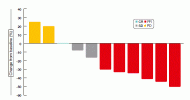Inhibition of HER2 driver mutations can confer benefits
Amplification or overexpression of HER2 (ErbB2) has been identified in NSCLC, and somatic HER2 mutations occur in approximately 2 % to 4 % of patients [1, 2]. Response to chemotherapy is poor in the setting of HER2-mutant advanced NSCLC [3]. Similarly, single-agent pan-HER inhibitors appear to have only limited benefit, with rare and short-lived responses [4, 5].
Neratinib plus temsirolimus
Dual pathway inhibition represents a potential treatment approach here. The HER2/ EGFR-inhibiting TKI neratinib and the mTOR inhibitor temsirolimus have synergistic effects, according to preclinical data [4] and a phase I study [5]. Therefore, an international, randomised phase II trial tested neratinib 240 mg OD with and without temsirolimus 8 mg/week in 60 patients with advanced or metastatic HER2-mutated NSCLC [6]. Each arm was evaluated independently, as single-agent neratinib had not been specifically assessed in lung cancer before.
This inhibition of both the HER2 and the PI3K pathways induced some activity that was superior to HER2 pathway block alone. Neratinib plus temsirolimus treatment gave rise to median PFS of 4.0 months (vs. 2.9 months with single-agent neratinib) and median OS of 15.1 months (vs. 10.0 months). Fourteen percent of the patients achieved responses with the combination (vs. 0 %). Here, one patient obtained complete remission (2 %), and five showed partial remission (12 %). The most common toxicity was diarrhoea, but this was manageable with upfront loperamide prophylaxis.
According to the analysis of the distribution of somatic HER2 mutations and best response to therapy, mutation-specific responses did not occur; occasional responses were observed across multiple HER2 variants. As some patients had prolonged responses of > 1 year, the search for predictive biomarkers is ongoing.
Promising results with pyrotinib
The novel oral TKI pyrotinib targets the binding of ATP to HER2 and EGFR in an irreversible manner. Encouraging preliminary findings from an open-label, single-arm phase II trial were presented at the WCLC [7]. This study assessed pyrotinib 400 mg OD in 11 patients with advanced, HER2-positive NSCLC after at least one chemotherapy regimen.
Partial responses were achieved in six patients (54.5 %), and three patients (27.3 %) experienced disease stabilisation (Figure). The median PFS was 6.2 months, while OS had not been reached at the time of analysis, when five patients were still on treatment. Diarrhoea, fatigue and rash were the most common AEs, but all of these were grades 1 or 2. A multi-centre, large-scale phase II clinical trial will be conducted to validate these results.
Moreover, a single-arm, open-label, multi-centre phase II trial is currently testing the ErbB family blocker afatinib in patients with advanced HER2-mutation-positive NSCLC, as a single agent and in combination with paclitaxel after failure of platinum-based chemotherapy [8]. Afatinib has demonstrated preclinical activity in HER2-mutant lung cancer models and has also shown clinical activity in patients with HER2-mutant NSCLC [2, 9].
Figure: Responses to pyrotinib in 11 patients with advanced, HER2-positive NSCLC
REFERENCES
- Yu HA et al., Analysis of tumor specimens at the time of acquired resistance to EGFR-TKI therapy in 155 patients with EGFR-mutant lung cancers. Clin Cancer Res 2013; 19: 2240-2247
- Mazières J et al., Lung cancer that harbors an HER2 mutation: epidemiologic characteristics and therapeutic perspectives. J Clin Oncol 2013; 31(16): 1997-2003
- Garrido-Castro AC & Felip E. HER2 driven non-small cell lung cancer (NSCLC): potential therapeutic approaches. Transl Lung Cancer Res 2013; 2(2): 122-127
- Perera SA et al., HER2YVMA drives rapid development of adenosquamous lung tumors in mice that are sensitive to BIBW2992 and rapamycin combination therapy. PNAS 2009; 106(2): 474-479
- Gandhi L et al., Phase I study of neratinib in combination with temsirolimus in patients with human epidermal growth factor receptor 2-dependent and other solid tumors. J Clin Oncol 2014; 32(2): 68-75
- Gandi L et al., Neratinib ± temsirolimus in HER2-mutant lung cancers: an international, randomized phase II study. WCLC 2016, MA04.02
- Ren S et al., Preliminary results of a phase II study about the efficacy and safety of pyrotinib in patients with HER2-mutant advanced NSCLC. WCLC 2016, MA04.03
- Zhou C et al., Afatinib in patients with advanced HER2 mutation-positive NSCLC previously treated with chemotherapy. WCLC 2016, P2.06-013
- De Grève J et al., Clinical activity of afatinib (BIBW 2992) in patients with lung adenocarcinoma with mutations in the kinase domain of HER2/neu. Lung Cancer 2012; 76: 123-127
More posts
Practice-changing refinements of lung cancer staging
Practice-changing refinements of lung cancer staging The 8th edition of the TNM
Anti-angiogenesis with nintedanib: activity in mesothelioma, and potential biomarkers
Anti-angiogenesis with nintedanib: activity in mesothelioma, and potential biomarke
Who is a candidate for immunotherapy?
Who is a candidate for immunotherapy? Johan Vansteenkiste, MD, PhD, Respiratory
Immunotherapy: novel anti-PD-L1 antibodies & various combination regimens
Immunotherapy: novel anti-PD-L1 antibodies & various combination regimens O
Liquid biopsy in the context of EGFR and other mutations
Liquid biopsy in the context of EGFR and other mutations Compared to tissue bio
Emerging treatments in ALK-positive NSCLC: new options, but also new challenges
Emerging treatments in ALK-positive NSCLC: new options, but also new challenges





